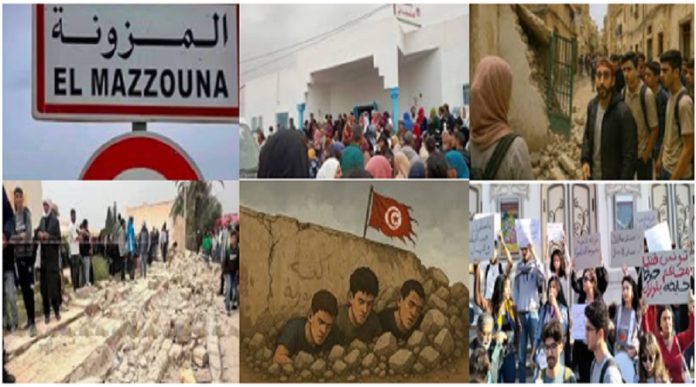Director-General of Housing at the Ministry of Public Works and Housing, Najib Senoussi, stated that the July 2024 law regulates interventions in dilapidated buildings at risk of collapse.
In a statement to the National Radio, Senoussi confirmed that this new law empowers municipalities to take immediate measures, including evacuation, structural reinforcement, demolition, or renovation of such buildings. He emphasized the urgency for municipalities to enforce the law’s provisions.
Endless blame-shifting
A bill on dilapidated buildings, presented to the Assembly of People’s Representatives (ARP) in November 2023, estimated around 1,000 such structures in Greater Tunis, with 100 requiring immediate evacuation to protect occupants’ lives.
Mahdia ranks second, with 530 dilapidated buildings, 135 of which need evacuation.
Nabeul follows with 280, including 48 requiring evacuation (or demolition, to avoid a repeat of the Mezzouna school collapse).
Jendouba has 175 dilapidated buildings, 40 needing evacuation, while Kairouan—where part of the city wall collapsed similarly to Mezzouna’s school—has 90 such buildings, 56 under evacuation orders. Data indicates these figures rise by 8% annually.
Senoussi explained that once a municipality is alerted about an unsafe building, it must act promptly. If the owner fails to contact authorities within three months, the municipality intervenes directly.
If the owner resists, the municipality can evacuate, seize, and manage the building on the owner’s behalf. Yet, critics question why Tunis municipality has not addressed two precarious buildings on “Rue Cyrus le Grand” in Tunis—one tilting like the Leaning Tower of Pisa, the other propped by iron beams, obstructing the street.
For schools, the funds are held by the Treasury
As usual, Tunisia’s administration engages in blame-shifting over infrastructure maintenance, whether voluntary or enforced. The root issue remains budgetary.
In today’s political and economic climate, education officials risk corruption accusations if they seek external funding—even from donors (like Hafedh Zouari’s support for a Kalaa Kébira primary school) or grassroots fundraising (a principal recently faced disciplinary action for this).
Law No. 98 (2000), Tunisia’s Finance Law for 2021, established the “Fund for Supporting Educational Institutions, their Maintenance, and Upkeep”.
Managed by the Education Minister, this fund is held in the General Treasury of Tunisia and financed by donations and mandatory parental contributions (school enrollment fees), despite Tunisia’s professed commitment to free education.
The money for school maintenance exists—yet remains idle in the Treasury. The exact amount is unknown, and the fund has never been discussed in annual budget debates. The Treasury, under the Finance Ministry, declined to comment when approached for clarification.
Tight-lipped and silent—the Finance Ministry offered no answers.












